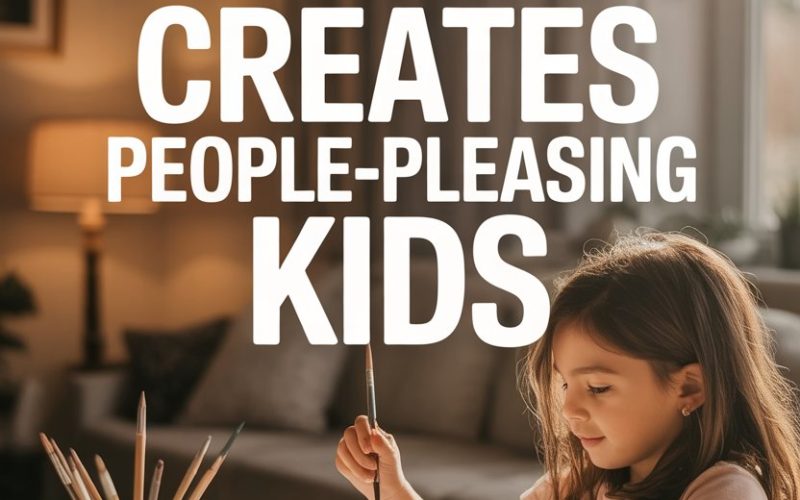Ever noticed how some children can’t say no to a sleepover they don’t want, or will eat Auntie Marge’s mystery casserole with a forced grin?
There’s a reason behind that glazed, eager-to-please look. And—spoiler alert—it’s not just their love for tuna surprise.
Let’s talk about the one parenting pattern that breeds people-pleasing kids. Hint: it doesn’t involve bribing anyone with biscuits.
Where People-Pleasing Starts: Approval Hunting 101
It begins with the best intentions, as all great parenting quirks do.
You want your child to be polite, kind, likable—a little angel you can proudly bring to brunch. That means lots of praise for “good” behaviour, especially when your child makes you (or others) happy.
Extra bedtime stories for saying please. High-fives for sharing, even when it’s their prized dinosaur.
The hiccup? Kids soak up approval like a sponge in a puddle.
Before long, pleasing others becomes their personal mission. They start scanning faces for approval, adjusting themselves to keep adults (and friends) smiling.
Those “well-behaved” children? Masters of the approval game.
It’s not just anecdotal, either. According to research ,kids who are consistently rewarded for pleasing adults can become hypersensitive to others’ emotions, often at the expense of their own needs.
The Praise Trap: When ‘Good Job’ Goes Bad
You’ve probably heard the advice: “praise the behaviour you want to see.” It’s everywhere from parenting books to that smug dad at playgroup with his sticker chart.
Positive reinforcement definitely has a place, but it’s a slippery slope into praise addiction.
Too much praise for being “nice” or selfless, and suddenly your child thinks their worth hinges on making others happy.
Share your crisps? You get a gold star. Stand up for yourself? That’s…awkward silence. The message is clear: “Good kids don’t rock the boat.”
Children start to fear disappointing adults. They’ll ignore their own discomfort, or squash their opinions, just to keep the mood light.
Psychologist Dr. Kristin Neff found that excessive praise can undermine self-worth and self-compassion. Kids learn to look outward for validation, missing the chance to tune into their own feelings.
Why Saying No Feels Dangerous
If “no” is a dirty word in your household, you might spot the signs: your child apologising for tiny mistakes, agreeing to things they dislike, or worrying about hurting others’ feelings.
Refusing someone, even gently, becomes a risk. What if Mum gets disappointed? What if the teacher thinks I’m rude?
Cue the people-pleasing: “Sure, I’ll trade my favourite toy for your soggy apple slice!”
It’s not just about sharing toys.
People-pleasers are more likely to endure bullying, avoid leadership roles, and struggle to voice boundaries as teens—and, yes, as adults. Clinical psychologist Dr. Harriet Braiker calls it “the disease to please.”
The Hidden Cost to Grown-Ups
People-pleasing isn’t just uncomfortable for your child; it’s exhausting for the future adult they’ll become.
Chronic yes-saying can lead to burnout, anxiety, and resentment. In relationships and the workplace, it’s a recipe for low self-esteem and feeling overlooked.
No one wants their grown-up child still eating tuna surprise to keep the peace at 35.
Spotting the Pattern at Home
Not sure if this pattern has crept in? Here’s what to look for:
- Your child is overly concerned about making you (or others) happy.
- They say “sorry” for things that aren’t their fault.
- They rarely disagree or assert their preferences.
- You catch them people-pleasing with friends or teachers.
- They have a meltdown after a day of “being good,” as if the effort has drained every last drop of energy.
Sometimes, the signs are subtle. Other times, it’s a dramatic “I’m FINE!” while they wince through a playdate they never wanted.
Raising Kids Who Don’t Lose Themselves Pleasing Others
Now for the good news: this pattern can be flipped. Your child can learn to be kind and considerate without becoming a world-class doormat.
Here’s how you can start tonight (really—no family therapy required, promise).
Celebrate Assertiveness
When your child says “no,” treat it like a milestone. If little Sam announces, “I don’t want to play right now,” you don’t need to break out the bunting, but a simple “Thanks for telling me how you feel” goes a long way.
This doesn’t mean letting them run riot or ignore manners, but it does mean honouring their voice. Yes, even when it’s inconvenient. Even when you just want them to eat the blooming casserole.
Child development experts at Raising Children Network suggest that assertiveness should be praised and modelled, not just compliance.
Teach the Difference Between Kindness and Pleasing
Kindness comes from the heart. People-pleasing comes from anxiety.
Let your child know it’s wonderful to be thoughtful, but not at their own expense. “It’s lovely to share, but it’s okay to save your last biscuit if you want to.”
Storytime is a great moment for this—point out when characters stand up for themselves or set boundaries, not just when they’re self-sacrificing heroes.
Avoid Over-Praising Niceness
Everyone loves a polite child, but if you clap every time your kid hands over their toy, the message is clear: they earn love by giving themselves up.
Try praising the process, not just the result. Instead of “You’re such a good boy for sharing!”—how about, “I saw you thinking about whether you wanted to share, and you made a kind choice”?
This gives them space to listen to their own feelings, not just chase approval.
Model Standing Up for Yourself (Even Awkwardly)
Kids learn most from what you do, not what you say. If they see you apologizing to the waiter for sending back cold chips, or saying yes to every PTA request, they’re watching and learning.
Model healthy boundaries—even if it feels clumsy. “I’d love to help, but I can’t right now.” “No, thank you.” If saying no fills you with dread, you’re not alone.
But the more your child sees you do it, the more normal it becomes.
Parenting coach Sarah Ockwell-Smith champions imperfect, honest boundary-setting for parents. It’s not about being flawless; it’s about showing that having needs is human.
Help Kids Tune Into Their Feelings
People-pleasers lose touch with what they actually want.
You can help your child name their feelings and preferences—even the prickly ones. “Does your tummy feel funny when you say yes to something you don’t want to do?” “What would you like to do instead?”
Emotion charts or simple “weather reports” (“Are you sunny or cloudy inside?”) can make feelings less mysterious. Over time, your child learns their feelings matter as much as anyone else’s.
Child psychologist Dr. Laura Markham recommends regular emotion check-ins for developing self-awareness and confidence.
Let Them Disappoint You (Just a Little Bit)
Brace yourself: sometimes, your child’s best interests mean they’ll disappoint you. Maybe they won’t hug Granny goodbye, or they’ll refuse to join in the family group photo.
It’s tempting to cajole or guilt-trip (“You’ll hurt Granny’s feelings!”), but here’s the thing—learning to handle someone else’s disappointment is a life skill.
You can be honest about your feelings (“That makes me a bit sad, but it’s your choice”) without demanding that your child squash their needs.
The world won’t end. Granny will survive.
Children who occasionally disappoint us in small ways grow up brave enough to set boundaries that really matter.
Encourage Independent Decision Making
Give your child safe chances to make their own decisions. Pick out their outfit, choose a snack, decide whether to play outside or read.
Start small, and respect the outcome—resist the urge to “fix” their choices.
The more your child practices deciding for themselves, the more they trust their inner voice—and the less likely they’ll bend themselves into knots to please everyone else.
People-Pleasing Isn’t a Life Sentence
Here’s the brilliant news: you’re not stuck with a yes-bot forever. The pattern that creates people-pleasing kids is powerful, but it isn’t unbreakable.
With a few tweaks in the way you praise, model, and support your child, you’ll set them up to be kind without being a pushover.
It’s not about raising rebels; it’s about raising kids who feel safe being themselves, even when that means someone else isn’t thrilled.
And as for Auntie Marge’s casserole? Well, maybe next time your child will say, “No, thank you.” And you’ll be the one cheering—even if dinner is just toast.
Kinder, Not Just Nicer
Raising a child who’s thoughtful without losing themselves is possible. It doesn’t mean less manners or fewer friends—it means a little more courage, a little more voice, and a lot less tuna surprise.
Tonight, try giving your child space to have their own opinion, even if it’s awkward. Praise their honesty. Let them disappoint you, just a bit.
You might discover that a child who can say “no” when it matters is the very best kind of kid there is.




